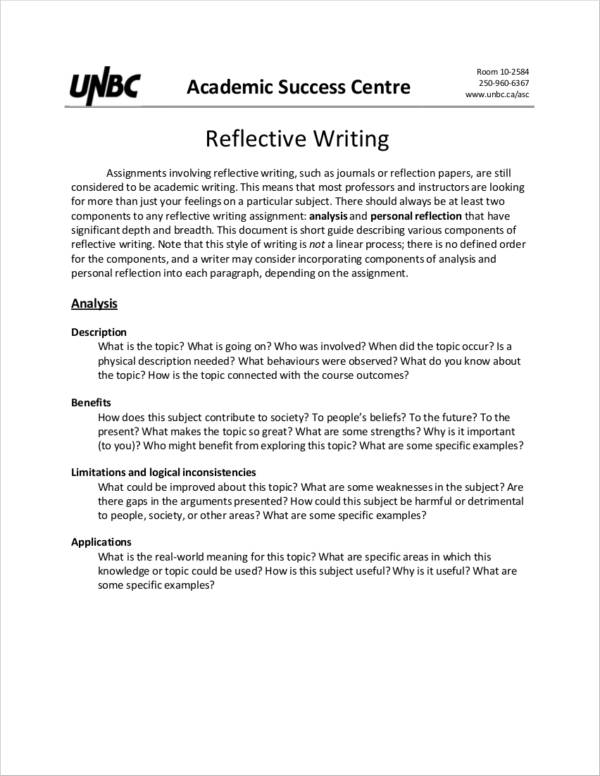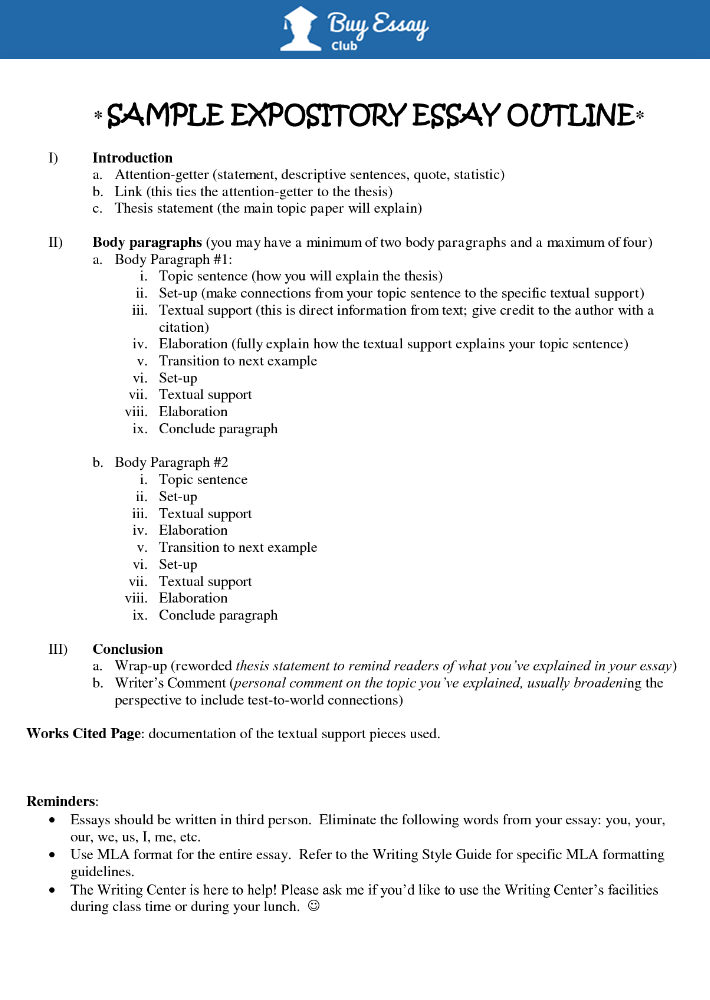
Being a reflective learner involves making your learning a more conscious process. It helps you to become an active learner by asking questions and thinking critically about your own ideas. This can be a private process that you undertake as one of your own personal study strategies, or it may be part of your formal assessment 3 rows · Reflective writing as an assessment is a great way for your marker to see your thoughts progress To find out more see the section on essay writing. Business example. The following example comes from business. Thanks to Dr Colleen Hayes for the three samples. Students were asked to write a reflective essay on their learning in the course by responding to the following question
Examples of Reflective Assignments | The Learning Centre – Online Programs – Expires May
Being a reflective learner allows you to step back from what you are learning and develop your critical thinking skills by analysing your experience and improving on your future performance. I kept a learning journal throughout my undergraduate degree reflecting on anything encountered during my studies I found particularly thought-provoking.
When it came to applying for Honours, I had an extensive list of interesting topics to choose from. Being a reflective learner involves making your learning a more conscious process. It helps you to become an active learner by asking questions and thinking critically about your reflective writing examples for students ideas.
This can be a private process that you undertake as one of your own personal study strategies, reflective writing examples for students, or it may be part of your formal assessment.
You may find there are unexpected rewards in consciously reflecting on your learning. The reflective process can help you find out things you had not considered before and you may even find that your academic writing improves, reflective writing examples for students.
There are many levels of reflection. As you progress through your studies, you will develop your reflective practice and gradually learn to reflect at a deeper, more critical level. It is a useful to keep in mind that reflecting critically is an extension of critical thinking.
So what should you reflect on during your studies? Anything and everything! Reflecting on your experiences allows you to discover more about what you are learning and how you learn the reflective process.
There is no right or wrong way to reflect on your learning. Once you begin to reflect regularly you can review what you need to do and take steps to progress your own learning. One suggestion is to keep a learning journal to help you develop a regular, informal habit of reflecting on your learning experience. Use these question prompts to get started on your reflections. For further ideas download the guide reflective writing examples for students on your learning'. We use cookies to improve your experience.
You consent to the use of our cookies if you proceed. Visit our Privacy policy for more information. Enrolment, fees and money Enrolment, fees and money Enrolment Before you enrol Plan your course Course maps How to enrol Enrolment codes and terminology After you've enrolled Re-enrol for next year Change your enrolment details Course transfer Intermit or discontinue Change your personal details Rule breaches Majors, reflective writing examples for students, minors and specialisations Electives STAR Apply for cross-institutional study Rights and Responsibilities Information privacy for students Articulation Unique student identifier.
Scholarship payments Intermitting your scholarship FAQ. Student loans Natural disaster grants Rural Clinical Support Scheme Nursing and Allied Health Rural Clinical Support Scheme Medicine WIL Student Support Scheme Managing expenses Centrelink approved courses for postgraduate students Tertiary Access Payment Program.
Your Deakin Card Top up your Deakin Card. Academic documents. Private Travel Insurance Policy Personal Accident Insurance for students Insurance for students on placements or work experience.
Studying Reflective writing examples for students and results Result release Results FAQ Results key Academic progress Student integrity Assignments Exam timetables General exam information Campus based exams Change Cloud campus unit exam location Cloud Campus unit exams Special consideration Weighted Average Mark.
Academic skills HDR Referencing English for Uni Masters by Coursework Appointments. Academic Study Getting Started and Orientation Social Connections DUELI and Deakin College Become a mentor SHS Contact Us.
IAS HDR Graduates Institute Staff Exams Student support Timetables. Enrolment Conditions for your Student Visa Compliance and Visas DUELI Independent learning centre School Age Children. Global Citizenship Program Trimester Abroad Short Term Partner Programs Global Experiential Learning New Colombo Plan Faculty-led Study Programs Information sessions Costs and funding opportunities Pre-Departure Sessions International SOS FAQs Contact us. Your Campus Accommodation Warrnambool Geelong Burwood Geelong Waterfront DRS Awards.
Active transport Flexicar Deakin bus services Carpooling Public Transport. Parking fees and charges. Room bookings Timetable Work request Contractor Portal Bulletin Board IPG Feedback. A-Z Waste Disposal Sustainability Information Sustainability case studies Get Involved Sustainability Initiatives Living Labs at Deakin. Get Involved Elite Athlete Program Profiles Become a Peer Leader DeakinACTIVE DUSA. Health and Wellbeing Deakin Medical Centre Vaccinations Campus Information Online Booking Physiotherapy Travel Health Health and Wellness Services.
About Safer Community Building a respectful community Report a concern Sexual harm disclosure. Places of worship Contact a chaplain Our Chaplains. Who can use services? Types of support Request support Working with DRC Campus access Disability Action Plan Access Plans Disability information for staff. Topics to explore About our service Navigate. Health and wellbeing Employee Wellbeing Support ChemWatch Checklists and forms Accident and hazard reporting. Safety and Security Safety tips when out and about Safety tips when on campus Safer Community About Safer Community Building a respectful community Report a concern Sexual harm disclosure.
Building Access FAQ, reflective writing examples for students. Faculties Faculty of Arts and Education Enrolment Assessment extensions Peer mentoring Work Integrated Learning Academic Progress Research. International study opportunities Intensive program MMM Intensive Program T3 EOI Form Intensive Units Study abroad BL Abroad Student Support Enhance your study Research Contact us Deakin Bowater Business Challenge - Postgraduate Challenge EOI for visiting academics Exchange Tracking Faculty of Business and Law International opportunities Work Integrated Learning WIL.
School reflective writing examples for students Nursing and Midwifery School of Health and Social Development Student Support Research School of Exercise and Nutrition Sciences School of Medicine School of Psychology International Study Opportunities Work Integrated Learning SEATS.
Enrolment and course maps Work Integrated Learning Peer Support Network Global Scholars Global experiences and placements Health and Safety Research students Architecture and Built Environment students Engineering students IT students Life and Environmental Sciences students. Research PhD Xtra Induction and Candidature Induction Completing your Candidature Engagement Form Supervision What is confirmation? Changes to candidature Candidature Frequently Asked Questions Annual review Annual Review - FAQs for supervisors Publishing Online forms.
Support eResearch. Thesis structure options HDR Examinations Examination outcomes Creative work examinations Advice on writing your thesis Examination procedures Forms and guidelines. Intellectual property Grievances and problems Forms and guidelines. Dean of Students Student Complaints Student Conduct Student Appeals Appeal your decision. Help IT Help ICT standards Exam assessment banner Pink Exam assessment banner Blue. eVALUate FAQ eVALUate: You said, we did. Suicide intervention Mental illness Medical emergency First Aiders First aid and medical emergencies Emergency policies Critical incidents and trauma.
Browser Settings FAQ Help with CloudDeakin CloudDeakin Guides. Home Students Studying Study support Academic skills Reflective learning. Reflective learning. Reflective learning is active learning What should I reflect on? Start reflecting Reflective learning is active learning I kept a learning journal throughout my undergraduate degree reflecting on anything encountered during my studies I found particularly thought-provoking.
Ari Moore - Senior Writing Mentor Being a reflective learner involves making your learning a more conscious process.
Benefits of reflecting on your learning Examine what you have learned and how you have learned it. Demonstrate how your thinking grows and develops over time Assist with making connections between what you already know and what you are learning Help you learn from mistakes by identifying how you would do things differently next time Encourage you to become a reflective practitioner in your future career. What should Reflective writing examples for students reflect on?
You can reflect on: how and when you learn best what it is that drives your learning and what you are passionate about your progress in an area of study over reflective writing examples for students your process in solving a difficult problem in your academic work your reactions to the texts you are reading what your essay title means and how to go about writing it feedback on your assessments and how to improve group work tasks and seminar discussions your own values, preferences and biases, and how this might impact your own writing what is difficult at the moment and why?
What is the next step? Who or what can help me here? Start reflecting There is no right or wrong way to reflect on your learning. Questions to get you started: What happened during that event or experience? And why did it happen? What was my role in the event? And why did I adopt that particular role? What were my feelings during that experience? And why did I feel that way?
What were my thoughts during that experience? And why did I think that way? How do I interpret what I experienced or observed? What might this experience mean in the context of my course? What other perspectives, reflective writing examples for students, theories or concepts could be applied to interpret the situation?
How can I learn from this experience? Other reflection tools: Use CloudDeakin portfolio to evidence and reflect on your learning experiences. You might also like: Organising your studies Critical thinking Responding to feedback Reflective writing for assessments. Last updated: November 24, pm Page custodian: Division of Student Life, reflective writing examples for students.
Writing a Good Reflective Essay: from Introduction to Conclusion!
, time: 14:38Examples of reflective practice - Reflective Practice - LibGuides at Southern Cross University

Reflective writing gives you an opportunity to think deeply about something you've learned or an experience you've had. Watch the video below for a quick introduction to reflective writing. The video includes an example of reflecting on practice, but the approach is equally useful when reflecting on To find out more see the section on essay writing. Business example. The following example comes from business. Thanks to Dr Colleen Hayes for the three samples. Students were asked to write a reflective essay on their learning in the course by responding to the following question Reflective writing requires you to show that you can evaluate what you read, think, and do, by acknowledging a range of viewpoints and possibilities. When undertaking a reflective writing task, you need to draw connections between what you have been asked to reflect on (for instance a classroom experience or your own learning in a unit) and relevant theories

No comments:
Post a Comment